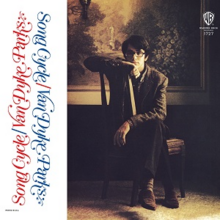Song Cycle (album)
| Song Cycle | ||||
|---|---|---|---|---|
 |
||||
| Studio album by Van Dyke Parks | ||||
| Released | December 1967 | |||
| Recorded | 1967 | |||
| Studio | Sunset Sound Recorders, Hollywood | |||
| Genre | Avant-pop | |||
| Length | 32:39 | |||
| Label | Warner Bros. | |||
| Producer | Lenny Waronker | |||
| Van Dyke Parks chronology | ||||
|
||||
| Singles from Song Cycle | ||||
|
||||
| Professional ratings | |
|---|---|
| Review scores | |
| Source | Rating |
| Allmusic | |
| Rolling Stone | (not rated) |
| Pitchfork | (9.0/10) |
Song Cycle is the debut album by American recording artist Van Dyke Parks, released in December 1967 by Warner Bros. Records. It mixes a number of genres, including bluegrass, ragtime, and show tunes – framing classical styles in the context of 1960s pop music. Upon its release, Song Cycle was largely raved by critics despite lukewarm sales, and later gained status as a cult album.
With the exception of three cover songs, Song Cycle was written and composed by Parks, while its production was credited to future Warner Bros. Records president Lenny Waronker. The album's material explores unconventional song structures, and lyrically focuses on American history and culture. The subjects of many songs are Southern California locales, including Laurel Canyon Boulevard, Vine Street, Silver Lake Boulevard, and Palm Desert. The lyrics on Song Cycle also reflect Parks' history working in both the film and music industries of Southern California.
In Los Angeles during the mid-1960s, Van Dyke Parks became known as an in-demand session pianist, working with such artists as The Byrds, Tim Buckley, and Paul Revere & the Raiders. At the same time, he had been unsatisfied with contemporary pop music and its increasing submissiveness to the British invasion, going so far as to say, "apart from Pet Sounds I didn't find anything striking coming out of the United States." Wanting to give "an American experience which would be uniquely disassociable from the Beatles/British pop viewpoint," he was involved with numerous works that would indulge his interest in Depression-era American pop and folk music, such as co-writing and arranging much of Harper's Bizarre's second album Anything Goes; releasing his own singles "Come to the Sunshine", "Number Nine", "Colours"; and most notably providing lyrical content to The Beach Boys' ill-fated Smile album.
...
Wikipedia
